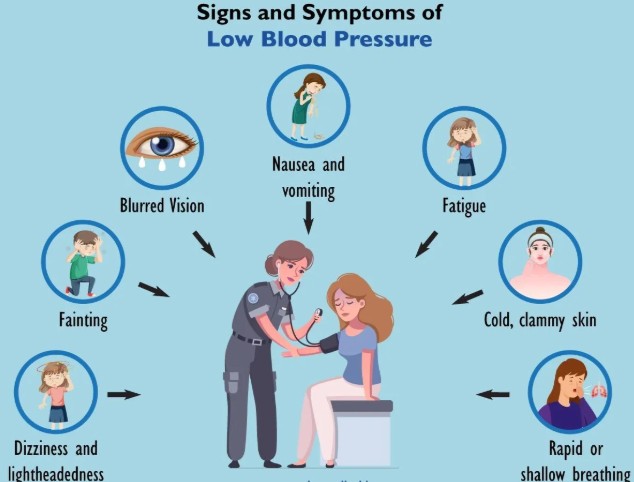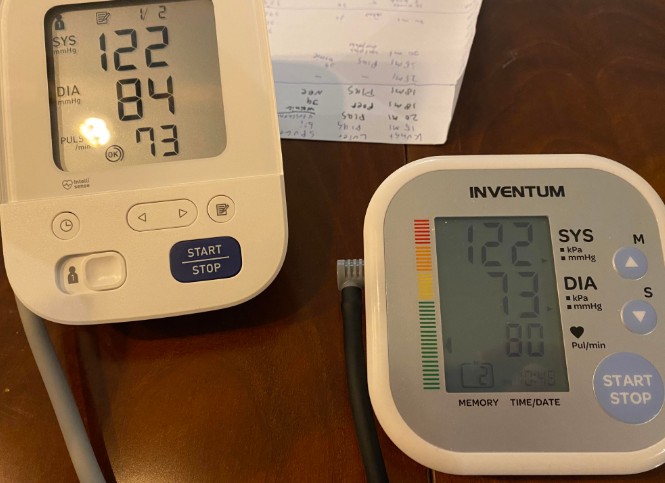Maintaining healthy blood pressure is essential for overall heart health. This guide covers what’s considered normal, low, and high blood pressure by age, along with common symptoms and natural ways to manage it.
Blood pressure is the force that blood exerts on artery walls as the heart beats and rests. It’s measured in systolic and diastolic values in mmHg.
Healthy blood pressure supports proper blood flow and circulation, ensuring that oxygen and nutrients reach organs efficiently. Consistently high or low readings can affect heart rate and signal potential issues with cardiovascular health.
That’s why understanding your blood pressure numbers is key to preventing conditions like hypertension, stroke, and heart disease.
Blood Pressure Chart:
| BP Reading | Category | Systolic (Top) | Diastolic (Bottom) |
|---|---|---|---|
| Normal | Healthy BP | Less than 120 | Less than 80 |
| Elevated | At risk | 120–129 | Less than 80 |
| Stage 1 Hypertension | Mild high BP | 130–139 | 80–89 |
| Stage 2 Hypertension | Severe high BP | 140 or higher | 90 or higher |
| Hypotension | Low BP | Less than 90 | Less than 60 |
These blood pressure ranges apply across most adult age groups, but readings may vary based on age and health conditions.
What Counts as Low Blood Pressure?
Low blood pressure, or hypotension, is when readings are below 90/60 mmHg. It’s only a concern if symptoms like dizziness or fainting are present.
You might also feel lightheaded, weak, tired, or notice blurred vision and cold, clammy skin. While not always serious, ongoing symptoms should be checked by a GP.
Tracking your blood pressure helps spot patterns and manage underlying causes like dehydration, heart issues, or medication side effects.
What Are the Symptoms of Low Blood Pressure?
Low blood pressure is often linked to dizziness, fainting, blurred vision, fatigue, nausea, cold hands, poor focus, and lightheadedness when standing.
Common Signs of Low Blood Pressure
It can also cause shallow breathing, confusion, chest discomfort, and a weak or rapid pulse in more severe cases.
Symptoms might appear suddenly or gradually, especially when standing up too quickly (postural hypotension) or after large meals (postprandial hypotension).

When Symptoms May Worsen?
Low blood pressure symptoms often worsen during dehydration, extreme heat, after long periods of rest, or with certain medications. Older adults are particularly vulnerable to falls and fainting due to these drops in blood pressure.
What causes Low Blood Pressure?
Low blood pressure is often caused by dehydration, heart problems, blood loss, pregnancy, or medications, and it is linked to dizziness and fainting.
- Dehydration or blood loss reduces blood volume, leading to a drop in pressure.
- Heart and hormone issues like heart failure, thyroid or adrenal problems affect BP control.
- Medications such as diuretics, beta-blockers, and antidepressants can lower BP.
- Pregnancy or standing quickly causes temporary drops, known as postural hypotension.
- Sepsis, diabetes, or nutrient deficiency (B12/folate) can also trigger low blood pressure.
What Is Considered Normal Blood Pressure?
Normal blood pressure is considered to be around 120/80 mmHg. It means your heart is working well and blood is flowing through your body as it should.
This healthy range supports proper circulation, reduces strain on arteries, and lowers the risk of heart disease, stroke, and other cardiovascular problems.
Maintaining normal levels helps your organs get enough oxygen and nutrients, keeping your overall health in balance. Regular checks can catch changes early.
What’s the Normal Blood Pressure by Age in the UK?
Normal blood pressure in the UK is around 120/80 mmHg, but it may slightly rise with age. Adults over 60 often have a target below 150/90 mmHg.
| Age Group | Normal BP Range (mmHg) |
|---|---|
| 18–39 years | 90/60 to 120/80 |
| 40–59 years | 110/70 to 130/85 |
| 60+ years | 120/70 to 140/90 |
This is the general guideline, though individual targets can vary based on health and lifestyle.
What Is High Blood Pressure?
High blood pressure, or hypertension, is when the force of blood against artery walls is too high, often above 140/90 mmHg, and raises health risks.
It’s usually caused by poor diet, lack of exercise, stress, or conditions like kidney disease. Though it often shows no symptoms, it’s dangerous.
Managing it means reducing salt, staying active, maintaining a healthy weight, and taking medication if needed.
Regular checks help catch it early and protect heart health.

What are the Symptoms of High Blood Pressure?
High blood pressure often has no symptoms, but some may feel headaches, dizziness, blurred vision, chest pain, or shortness of breath over time.
In some cases, hypertension can also cause fatigue, nosebleeds, or a pounding feeling in the chest, neck, or ears. These signs usually appear when blood pressure is dangerously high.
That’s why it’s called the “silent killer”—many people don’t realise they have it until it causes serious problems like heart disease, stroke, or kidney damage.
Regular checks are key, especially if you’re over 40, overweight, stressed, or have a family history of high blood pressure.
What causes High Blood Pressure?
High blood pressure is often caused by stress, poor diet, lack of exercise, smoking, age, genetics, obesity, too much salt, or excessive alcohol use.
- Family history – Genetics can raise your risk, especially with age.
- Lack of exercise – Inactivity weakens the heart and raises pressure.
- High salt intake – Found in UK processed foods and takeaways.
- Too much alcohol – Regularly drinking over 14 units per week increases risk.
- Smoking – Narrows blood vessels and raises heart rate and pressure.
- Poor sleep – Sleep apnoea or irregular sleep patterns can affect BP.
- Chronic stress – Long-term stress keeps blood pressure elevated.
- Obesity – Extra weight makes the heart work harder.
- Health conditions – Diabetes, kidney or thyroid issues can contribute.
NHS advice: Check your BP regularly and make lifestyle changes to reduce your risk of stroke, heart disease, and other serious conditions.
How Can You Lower Your Blood Pressure Naturally?
The best way to lower blood pressure naturally is by cutting salt, staying fit, eating well, managing stress, and avoiding alcohol and smoking.
1. Eat a Heart-Healthy, Low-Salt Diet
Lowering your salt intake is key—too much sodium raises blood pressure. Focus on whole grains, leafy greens, fruits, and potassium-rich foods like bananas and sweet potatoes. These support heart health and help balance sodium.
2. Stay Active and Maintain a Healthy Weight
Exercise improves blood circulation and helps control hypertension. Aim for 30 minutes of walking, swimming, or cycling most days. Losing even a small amount of weight can reduce pressure on your heart.
3. Cut Alcohol and Quit Smoking
Drinking too much alcohol or smoking raises blood pressure and damages blood vessels. Reducing or quitting both supports better long-term heart and vascular health.
4. Manage Stress and Sleep Well
Chronic stress is a known trigger for high blood pressure. Practice mindfulness, deep breathing, or yoga. Prioritise good sleep—7 to 8 hours nightly helps regulate your blood pressure naturally.
5. Monitor Your Blood Pressure Regularly
Using a validated home monitor helps you track progress. Log your readings daily and check at the same time. Consistent monitoring helps catch changes early and guides healthy lifestyle choices.
How to Monitor Blood Pressure at Home?
Checking blood pressure at home is easy—sit upright, stay calm, wrap the cuff on your upper arm at heart level, and use a monitor that was validated.
It’s best to take readings at the same time each day, like in the morning before breakfast. Avoid caffeine, smoking, or exercise 30 minutes before checking.

Keeping a log of your results helps you and your GP track patterns, spot changes early, and adjust treatment if needed.
Regular monitoring is important because blood pressure can change with stress, diet, age, or medication. Catching high or low readings early can prevent serious health issues like heart disease or stroke.
What is the Difference between Systolic and Diastolic?
Systolic is the top number showing arterial pressure when the heart beats; diastolic is the bottom number showing pressure when the heart rests.
| Feature | Systolic | Diastolic |
|---|---|---|
| Position in Reading | Top number | Bottom number |
| What It Measures | Pressure occurs when the heart contracts and pumps blood | Pressure occurs when the heart relaxes between beats |
| Normal Range (UK) | Around 90–120 mmHg | Around 60–80 mmHg |
| Higher Reading Means | Possible high blood pressure (hypertension) | Can indicate health issues if too low or too high |
| Importance | Key indicator of cardiovascular risk | Reflects resistance in blood vessels during rest |
Knowing your blood pressure range is key to preventing heart-related issues. Whether you’re monitoring at home or working on lifestyle changes, understanding normal, low, and high BP can help you take control of your health.
Frequently Asked Questions (FAQs)
Can Stress Cause High Blood Pressure?
Yes, stress will temporarily increase blood pressure and can contribute to long-term hypertension.
What Foods Help Lower Blood Pressure?
These include leafy greens, oats, bananas, beetroot, and foods low in sodium and saturated fats.
Should I Worry About Low Blood Pressure?
This can be serious if you feel faint, confused, or have blurred vision—see a GP if symptoms persist.
Is 120/80 a Good Blood Pressure?
Yes, this is the ideal reading and considered perfectly healthy for most adults.
How Often Should I Check My Blood Pressure?
You should check it monthly if you’re at risk, or as advised by your healthcare provider.






